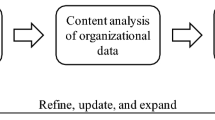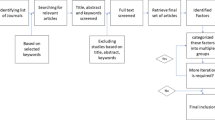Abstract
For some sectors, the management of client–provider knowledge exchanges is the core element of the business. This is especially the case for knowledge-intensive business services (KIBS) whose delivery entails intensive supplier–client cognitive interactions: KIBS firms supply clients with precious elements of technical and applicative knowledge, while clients give KIBS companies the knowledge items needed for designing a successful solution. Although trust has proved to be an essential ingredient of knowledge exchanges, empirical studies about its role are still scarce, especially as regards KIBS. The paper contributes to this topic by discussing the results of a multiple case study of computer services. Particularly, it (a) offers a knowledge-oriented description of client–provider interactions; (b) investigates the main mechanisms that govern such interactions; (c) analyses the role played by trust as antecedent and consequence of the interaction; (d) discusses the issue of development of trustworthy interactions between KIBS and clients.



Similar content being viewed by others
References
Aslesen HW and Isaksen A (2007) New perspectives of knowledge intensive services and innovation. Geographical Annals 89B (S1), 45–58.
Bagdoniene L and Jakstaite R (2009) Trust as basis for development of relationships between professional service providers and their clients. Economics and Management 14 (1), 360–366.
Becerra M, Lunnan R and Huemer L (2008) Trustworthiness, risk, and the transfer of tacit and explicit knowledge between alliance partners. Journal of Management Studies 45 (4), 691–713.
Bettencourt LA, Ostrom AL, Brown SW and Roundtree RI (2002) Client co-production in knowledge-intensive business services. California Management Review 44 (4), 100–128.
Blomqvist K (1997) The many faces of trust. Scandinavian Journal of Management 13 (3), 271–286.
Castaldo S, Premazzi K and Zerbini F (2010) The meaning(s) of trust. A content analysis on the diverse conceptualizations of trust in scholarly research on business relationships. Journal of Business Ethics 96 (4), 657–688.
Chesbrough HW (2003) Open Innovation: The New Imperative for Creating and Profiting from Technology. Harvard Business School Publishing, Boston.
De Bandt J (1995) Services aux enterprises: informations, produits, richesses, Economica, Paris.
Easterby-Smith M, Lyles MA and Tsang EWK (2008) Inter-organizational knowledge transfer: current themes and future prospects. Journal of Management Studies 45 (4), 677–690.
Ford DP (2003) Trust and knowledge management: the seeds of success. In Handbook on Knowledge Management (HOLSAPPLE CW, Ed), Vol 1, pp 553–575, Springer, Berlin.
Gambetta D (Ed) (2000) Can we trust trust? In Trust: Making and Breaking Cooperative Relations, Electronic edn, pp 213–237, Department of Sociology, University of Oxford, Oxford.
Huggins R and Weir M (2009) Valuing intellectual assets in knowledge-intensive business service firms: an agenda for intervention in Europe. In Proceedings of the International Forum on Knowledge Asset Dynamics (IFKAD). (SCHIUMA G, WEIR M, SPENDER JC, LERRO A and SCHIUMA G, Eds)Glasgow University, Glasgow, 17–18 February.
Leedy PD and Ormrod JP (2005) Practical Research – Planning and Design 8th edn Pearson, Upper Saddle River, NJ.
Leiponen A (2006) Organization of knowledge exchange: an empirical study of knowledge-intensive business service relationships. Economics of Innovation and New Technology 15 (4/5), 443–464.
Martinez-Fernandez MC and Miles I (2006) Inside the software firm: co-production of knowledge and KISA in the innovation process. International Journal of Services Technology and Management 7 (2), 115–125.
Martinez-Fernandez MC, Soosay CA, Bjorkli M and Tramayne K (2004) Are knowledge-intensive service activities enablers of innovation processes? – A study of Australian software firms. In CINet Conference Proceedings, pp 986–1000.
Mayer R, Davis J and Schoorman F (1995) An integrative model of organizational trust. The Academy of Management Review 20 (3), 709–734.
Miles I (2003) Knowledge Intensive Services’ Suppliers and Clients. Ministry of Trade and Industry, Finland.
Miles I (2005) Knowledge-intensive business services: prospects and policies. Foresight 7 (6), 39–63.
Miles I, Kastrinos N, Bilderbeek R and den Hertog P (1995) Knowledge-Intensive Business Services: Users Carriers and Sources of Innovation. EIMS Publication, Brussels.
Päällysaho S (2008) Customer interaction in service innovations: a review of literature. Research Report 195, Lappeenranta University of Technology.
Panteli N and Sockalingam S (2005) Trust and conflict within virtual inter-organizational alliances: a framework for facilitating knowledge sharing. Decision Support Systems 39 (4), 599–617.
Priestley JL (2006) Knowledge transfer within interorganizational networks. In Encyclopedia of Communities of Practice in Information and Knowledge Management (COAKES E and CLARKE S, Eds), pp 307–316, Idea Group, Hershey, PA.
Pro Inno Europe (2009) Challenges for EU support to innovation in services. Paper no. 12, Brussels.
Roberts J (2003) Trust and electronic knowledge transfer. International Journal of Electronic Business 1 (2), 168–186.
Scarso E (2009) Modeling the transfer of knowledge between organisations: a critical review of the current literature. In Proceedings of the 10th European Conference on Knowledge Management (BOLISANI E and SCARSO E, Eds), pp 737–746, Academic Conferences, Reading, UK.
Schoorman FD, Mayer RS and Davis JH (2007) An integrative model of organizational trust: past, present, and future. Academy of Management Review 32 (2), 344–354.
Şengün AE (2010) Which type of trust for inter-firm learning? Industry and Innovation 17 (2), 193–213.
Strambach S (2008) Knowledge-intensive business services (KIBS) as rivers of multilevel knowledge dynamics. International Journal of Services Technology and Management 10 (2/3/4), 152–174.
Weterings A and Boschma R (2009) Does spatial proximity to customer matters for innovative performance? Evidence from the Dutch software sector. Research Policy 38 (5), 746–755.
Wood P (2005) A service-informed approach to regional innovation – or adaptation? The Service Industries Journal 25 (4), 429–445.
Yin RH (2003) Case Study Research: Design and Methods 3rd edn Sage Publishing, Thousand Oaks.
Acknowledgements
The authors gratefully thank Kirsimarja Blomqvist for her useful suggestions and comments on a previous version of this paper.
Author information
Authors and Affiliations
Corresponding author
Rights and permissions
About this article
Cite this article
Scarso, E., Bolisani, E. Trust in knowledge exchanges between service providers and clients: a multiple case study of KIBS. Knowl Manage Res Pract 10, 16–26 (2012). https://doi.org/10.1057/kmrp.2011.28
Received:
Revised:
Accepted:
Published:
Issue Date:
DOI: https://doi.org/10.1057/kmrp.2011.28




